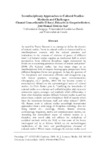Mostrar o rexistro simple do ítem
Interdisciplinary Approaches to Cultural Studies: Methods and Challenges
| dc.contributor.author | Cornut-Gentille D’Arcy, Chantal | |
| dc.contributor.author | Gregorio Godeo, Eduardo de | |
| dc.contributor.author | Estévez-Saá, José Manuel | |
| dc.date.accessioned | 2016-07-15T08:35:20Z | |
| dc.date.available | 2016-07-15T08:35:20Z | |
| dc.date.issued | 2008 | |
| dc.identifier.citation | AEDEAN 2008, 31: 101-111 ISBN-978-84-9749-278-2 | |
| dc.identifier.isbn | 978-84-9749-278-2 | |
| dc.identifier.uri | http://hdl.handle.net/2183/17024 | |
| dc.description.abstract | [Abstract] As stated by Tonny Bennett in an attempt to define the domain of cultural studies, “work in cultural studies is characterised by an interdisciplinary concern with the cultural practices and institutions in the contexts of relations of power of different kinds [...] Cultural studies supplies an intellectual field in which perspectives from different disciplines might (selectively) be drawn on in examining particular relations of culture and power” (1998: 27). Cultural studies has thus taken shape as an interdisciplinary field of enquiry drawing upon perspectives from different disciplines for its own purposes. In fact, the question of“its disciplinary and intertextual affinities and antagonism (e.g. with literary practices, sociology, mass communications, ethnography, etc.)” (Jordan, 2000: 99) has become central to contemporary debates on the epistemological status of cultural studies. As Chris Barker puts it, “clarifying the boundaries of cultural studies as a coherent and unified discipline with clear-cult substantive topics, concepts and methods which differentiate it from other discipline remains difficult. Cultural studies is, and has always been, a multi- and post-disciplinary field of enquiry which blurs the boundaries between itself and other subjects” (2004: 42). Recent work in cultural studies accordingly incorporates approaches from a wide range of disciplines including ―but not being limited to― sociology, history, literary criticism, anthropology, linguistics, media and communication studies, etc. Assuming the consolidated status of cultural studies as a discipline, this round table will address the multiplicity of analytical methods within the field, so that some of the issues interrogated will be as follows: Which are the methodological implications of the inter- and postdisciplinary character of cultural studies? Which major challenges do cultural studies need | |
| dc.language.iso | eng | |
| dc.publisher | Universidade da Coruña | |
| dc.title | Interdisciplinary Approaches to Cultural Studies: Methods and Challenges | |
| dc.type | info:eu-repo/semantics/conferenceObject | |
| dc.rights.access | info:eu-repo/semantics/openAccess |






